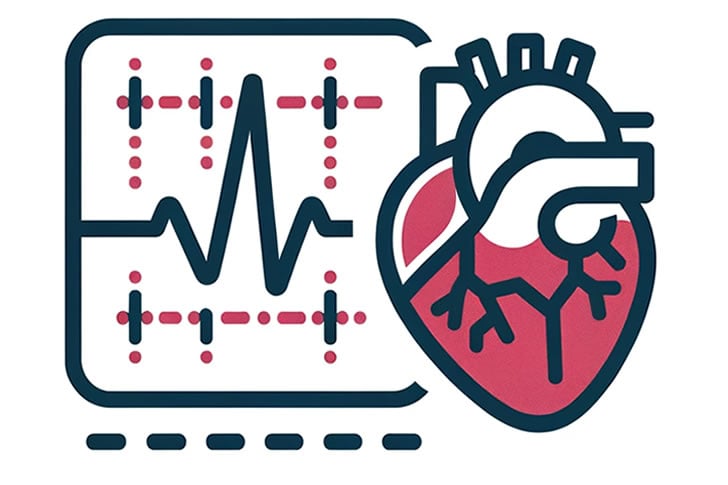A comprehensive guide to managing Atrial Fibrillation by understanding genetic factors and optimizing lifestyle choices.

Atrial fibrillation (AFib) is a common heart rhythm disorder that affects millions of people worldwide. It occurs when the heart’s electrical system malfunctions, causing an irregular and often rapid heartbeat. While the condition is influenced by a combination of genetic and lifestyle factors, managing atrial fibrillation effectively requires a comprehensive approach. This guide explores the role of genetics, lifestyle choices, and strategies to manage AFib and improve quality of life.
Understanding Atrial Fibrillation
Atrial fibrillation occurs when the upper chambers of the heart (atria) beat out of sync with the lower chambers (ventricles). This irregular rhythm can lead to symptoms such as palpitations, fatigue, shortness of breath, and an increased risk of complications like stroke and heart failure.
Key Facts About AFib
- AFib can be occasional (paroxysmal), persistent, or permanent.
- It is more common in older adults, but it can occur at any age.
- Risk factors include high blood pressure, diabetes, obesity, and a family history of the condition.
The Role of Genetics in Atrial Fibrillation
While lifestyle factors significantly contribute to AFib, genetics also plays an important role in determining an individual’s risk.
Genetic Factors
- Family History: Having a close relative with AFib increases your likelihood of developing the condition. Certain genetic mutations can predispose individuals to AFib.
- Genetic Testing: In some cases, genetic testing may be recommended to identify inherited conditions or mutations associated with AFib.
- Inherited Disorders: Conditions like hypertrophic cardiomyopathy or other inherited heart diseases can increase the risk of atrial fibrillation.
Implications of Genetics
- A genetic predisposition doesn’t guarantee you will develop AFib. It highlights the importance of proactive management and early intervention.
- Understanding your genetic risk can help you and your healthcare provider develop a tailored prevention or treatment plan.
Lifestyle Choices and Their Impact on AFib
Lifestyle factors can either exacerbate or help manage atrial fibrillation. By making healthy choices, you can reduce the frequency and severity of AFib episodes and lower your overall risk.
Heart-Healthy Diet
- Focus on Whole Foods: Include fruits, vegetables, whole grains, lean proteins, and healthy fats in your diet.
- Reduce Sodium: High sodium intake can lead to high blood pressure, a major risk factor for AFib.
- Increase Potassium: Foods like bananas, spinach, and avocados can help regulate blood pressure.
- Limit Processed Foods: Avoid sugary drinks, fried foods, and foods high in saturated and trans fats.
Regular Exercise
- Aerobic Activity: Moderate exercise like walking, swimming, or cycling can improve heart health and reduce AFib symptoms.
- Avoid Overexertion: High-intensity exercise may trigger AFib episodes in some individuals. Work with your doctor to develop an appropriate exercise plan.
- Weight Management: Maintaining a healthy weight reduces the strain on your heart and lowers AFib risk.
Stress Management
- Relaxation Techniques: Practice mindfulness, yoga, or deep breathing exercises to reduce stress, which can trigger AFib episodes.
- Sleep Hygiene: Poor sleep or untreated sleep apnea can worsen AFib. Aim for 7-8 hours of quality sleep per night.
Avoiding Triggers
- Alcohol: Excessive alcohol consumption is a common trigger for AFib. Stick to moderate drinking or avoid alcohol altogether if it exacerbates symptoms.
- Caffeine: While caffeine doesn’t trigger AFib in everyone, monitor your intake and reduce it if necessary.
- Tobacco: Smoking damages the heart and increases the risk of arrhythmias. Quitting smoking is critical for managing AFib.
Medical Management of AFib
While lifestyle changes are essential, medical treatment is often required to manage AFib effectively.
Medications
- Anticoagulants: Blood thinners like warfarin or direct oral anticoagulants (DOACs) reduce the risk of stroke.
- Rate-Control Medications: Drugs like beta-blockers or calcium channel blockers help slow the heart rate.
- Rhythm-Control Medications: Antiarrhythmic drugs help restore a normal heart rhythm.
Procedures
- Electrical Cardioversion: A procedure that uses electrical shocks to reset the heart’s rhythm.
- Catheter Ablation: A minimally invasive procedure that targets and destroys areas of heart tissue causing irregular rhythms.
- Pacemaker: In some cases, a pacemaker may be implanted to regulate the heart’s rhythm.
Monitoring
- Regular check-ups with a cardiologist are crucial for monitoring your heart’s health. Devices like wearable monitors or smartwatches with ECG capabilities can help track AFib episodes and detect irregular heart rhythms.
Tips for Managing AFib Day-to-Day
- Track Your Symptoms: Keep a journal of symptoms, triggers, and medications to share with your doctor.
- Stay Hydrated: Dehydration can trigger AFib, so drink plenty of water throughout the day.
- Take Medications as Prescribed: Adhere to your medication regimen to avoid complications.
- Build a Support Network: Join AFib support groups or connect with others who have the condition for encouragement and advice.
When to Seek Medical Attention
- Seek immediate help if you experience chest pain, difficulty breathing, or fainting, as these could indicate serious complications like a heart attack or stroke.
- Consult your doctor if your symptoms worsen or become more frequent, as your treatment plan may need adjustment.
Conclusion
Managing atrial fibrillation requires a combination of understanding your genetic predisposition and making intentional lifestyle choices. By adopting heart-healthy habits, working closely with your healthcare provider, and staying vigilant about your symptoms, you can effectively control AFib and reduce your risk of complications. Take proactive steps to protect your heart health and improve your quality of life.









